Whilst many claim that the following is all part of some conspiracy theory and over reaction, it must be remembered that for almost 30 years, the Tobacco industry hid the facts and even their own research which proved that smoking was a major cause of cancer and lung related illnesses.
Chris Ingram, editor of Unionsafety discusses the facts in this article written in a personal capacity:
 Ronald Reagan is remembered for many things, but his relationship with Aspartame, Donald Rumsfeld and the Federal Food and Drug Administration (FDA); is certainly not amongst them!
Ronald Reagan is remembered for many things, but his relationship with Aspartame, Donald Rumsfeld and the Federal Food and Drug Administration (FDA); is certainly not amongst them!
Some 30 years after being given a license to be used in food and drinks as an artificial sweetener; Aspartame, continues to cause concern amongst scientists, medical professionals and members of the public with regard to its safety and the fact that it has been proven as a cause of brain tumours and cancers in rats and subsequently accepted as a known human carcinogen by scientists and medical professionals all over the globe.
Aspartame is also known as, E951, Nutrasweet, Equal, Canderel, Spoonful, Equal Measure, Benevia, NatraTaste, Canderel; and is now re-branded as AminoSweet.
AminoSweet® is the brand name of the low calorie sweetener aspartame produced by Ajinomoto Sweeteners Europe, and is now being promoted as a ‘natural sweetener’ despite the fact there is absolutely nothing ‘natural’ about it.
A research scientist, upon combining two amino acids, aspartic acid and phenylalanine (which are never combined in nature), discovered the result tasted just like sugar, and aspartame was born and forced onto the world.
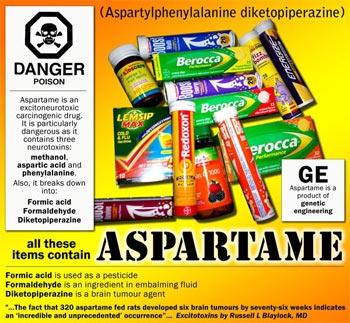 So What is in Aspartame?
So What is in Aspartame?
In total it is actually made up of three chemicals, all with their own damaging effects on human health:
* Phenylalanine, excess of which in the brain can lead to depression and schizophrenia: a single dose of aspartame raises blood phenylalanine levels.
The phenylalanine found in aspartame is defined as a neurotoxin by the Suicide and Mental Health Association International. Neurotoxins are substances that actually inhibit the function of neurons as well as block the release of neurotransmitters, which are chemicals within the brain responsible for mood. One of the key neurotransmitters in relation to mood is serotonin. When aspartame is consumed, it goes directly into the brain and lowers serotonin levels.
* Aspartic Acid raises blood plasma levels of glutamate, an excitotoxin, high levels of which kill cells by over-stimulation. Early diagnosis of this is not possible because over 75% of neural cells in a particular area of the brain may be killed before any clinical symptoms of chronic illness are detectable.
* Methanol - wood alcohol - is a highly toxic substance which is speedily absorbed by the body when taken with the other two chemicals. It breaks down into formic acid and the carcinogenic formaldehyde.
Aspartame is used in over 9,000 foodstuffs around the world and in almost every soft drink.
Adverse Health Effects
Since it was introduced in 1981, it has been the subject of a great many complaints reported to the Adverse Reaction Monitors of the US Food and Drugs Administration. In an article published in the “Journal of Neuropathology and Experimental Neurology" John W. Olney said that animal studies reveal high level of brain tumours in Aspartame-fed rats.
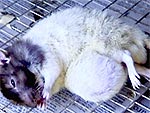 Indeed, 80% of complaints on food additives, received by the US Food and Drug Administration, are about aspartame.
Indeed, 80% of complaints on food additives, received by the US Food and Drug Administration, are about aspartame.
The FDA lists 10,000 aspartame complaints with 92 reactions, including death.
These include mania, rage, violence, blindness, joint-pain, fatigue, weight-gain, chest- pain, coma, insomnia, numbness, depression, tinnitus, weakness, spasms, irritability, nausea, deafness, memory-loss, rashes, dizziness, headaches, seizures, anxiety, palpitations, fainting, cramps, diarrhoea, panic, suppression of intelligence.
Diseases triggered include diabetes, MS, lupus, epilepsy, Parkinson's, tumours, miscarriage, infertility, fibromyalgia, infant death, Alzheimer's.
Dr Joseph Mercola, the well-respected nutrition and health researcher in the USA is no lover of aspartame. He is often quoted in debates about the drug:
“In 1991, the National Institutes of Health listed 167 symptoms and reasons to avoid the use of aspartame, but today it is a multi-million dollar business that contributes to the degeneration of the human population, as well as the deliberate suppression of overall intelligence, short-term memory and the added contribution as a carcinogenic environmental co-factor.
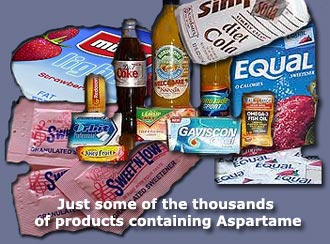 The FDA and Centers for Disease Control continue to receive a stream of complaints from the population about aspartame. It is the only chemical warfare weapon available in mass quantities on the grocery shelf and promoted in the media. It has also been indicated that women with an intolerance for phenylalanine, one of the components of aspartame, may give birth to infants with as much as a 15% drop in intelligence level if they habitually consume products containing this dangerous substance.”
The FDA and Centers for Disease Control continue to receive a stream of complaints from the population about aspartame. It is the only chemical warfare weapon available in mass quantities on the grocery shelf and promoted in the media. It has also been indicated that women with an intolerance for phenylalanine, one of the components of aspartame, may give birth to infants with as much as a 15% drop in intelligence level if they habitually consume products containing this dangerous substance.”
Despite being marketed as a "diet aid", Aspartame actually makes you FAT, by suppressing the brains reaction to serotonin, the substance which tells you to stop eating when you are full. The result is that you then crave carbohydrates in increasing quantity.
But how did it come to this you may ask:
Donald Rumsfeld, former U.S. Defence Secretary, was CEO of Searle which made aspartame at the time of Reagan becoming US president. Searle were going through major financial difficulties which could have resulted in the company going out of business – until aspartame was given a license to be used in food and drinks by the FDA.
The FDA was about to ban Aspartame but Donald Rumsfeld, had Ronald Reagan remove Jere Govan, the FDA Commissioner, and replace him with one Dr A.H.Hayes, who approved the product licence.
The health issue arguments surrounding Aspartame have been around for over 30 years and have included the increase of chances of diabetes in individuals who may be genetically predisposed to be at a higher risk of developing this condition, brain cancer and emotional and neurological disorders such as seizures, mood and sleep disorders, anxiety and depression.
Between 1973 and 1990, the incidence of brain tumours in people over 65 had increased by 67% in the US. Brain tumours in all age groups had jumped by 10% in the same period but the greatest increase occurred during 1985 – 1987 and these figures continue to rise.
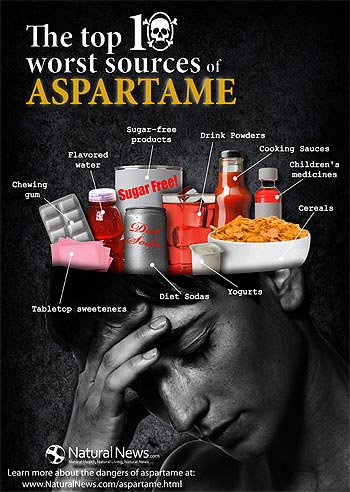 But the list of food and rink products which contain E951, Nutrasweet, Equal, Canderel and AminoSweet i.e. aspartame; is far too numerous to list here in full.
But the list of food and rink products which contain E951, Nutrasweet, Equal, Canderel and AminoSweet i.e. aspartame; is far too numerous to list here in full.
Suffice to say that it can be found in both diet and non-diet drinks, mints, chewing gum, low-calorie foods and medicines including syrups and antibiotics for children, frozen meals, ready made meals, multivitamins, pharmaceuticals, milk drinks, instant teas and coffees, yoghourt...and lots more ; 5,000+ products, which include Strawberry Ribena, White’s Lemonade, Pepsi Max, Pepsi Diet, Diet Coke, and most soft drinks aimed at children.
In the UK all products labeled as Sugar Free or with "No added sugar" contain aspartame, and it is a requirement to identify Aspartame on the label.
Equally products containing phenylalanine must also be labeled accordingly as it is a product of aspartame.
One major drinks manufacturer, known as Coca-Cola knew of the dangers of Aspartame because it originally opposed approval by the FDA. Indeed, its objections were published in the Congressional Record.
It said that Aspartame was inherently unstable and breaks down in the can, decomposing into methyl alcohol, formic acid, formaldehyde and other toxins.
Yet Aspartame, which is tremendously addictive, is now to be found in every can of Diet Coke.
In the UK companies such as ICELAND, SAINSBURYS and ASDA-WALMART HAVE NOW BANNED ASPARTAME FROM THEIR OWN-BRAND PRODUCTS.
But serious concerns about the artificial sweetener are not enough to stop millions of adults and their children from consuming it in both food and drinks on a daily basis. They have been doing so for the last 30 odd years and many scientists and medical professionals believe that the worldwide increase in cancer in adults and in children can be directly related to the eating and drinking of aspartame.
False And Manipulated Research Results
Whilst Searle, who manufactured aspartame, claimed to have conducted research to prove the safety of their product, numerous claims of bad conduct and the fiddling of research results and laboratory tests, have been going on since 1975.
In 1975, FDA commissioner Alexander Schmidt appointed a special task
force to examine 25 Searle tests, including 11 on aspartame. It discovered
major shortcomings.
"We have uncovered serious deficiencies in Searle's operations and
practices which undermine the basis for reliance on Searle's integrity in
conducting high-quality animal research to accurately determine or
characterize the toxic potential of its products," the investigators wrote
in their final report.
In July, 1976, Dr. Schmidt testified at a U.S. Senate hearing that he
agreed with the task force's conclusions. In 1977, the FDA appointed a
second task force that re-examined three of Searle's aspartame tests.
The investigators found Searle had removed possible tumours from
experimental animals, had failed to report all tumours discovered, had
written experimental protocols partway through tests, had failed to test
the stability of aspartame and other test substances, had possibly allowed
animals to avoid eating test substances, and had made recording errors
showing "dead" animals returning to life.
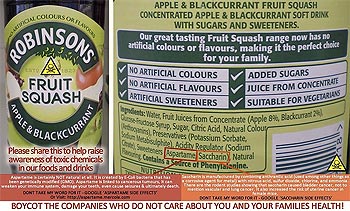 A Searle pathologist questioned on a key aspartame study told
investigators: "You should have seen things when this study was run -
there were five studies being run at one time - things were a mess."
A Searle pathologist questioned on a key aspartame study told
investigators: "You should have seen things when this study was run -
there were five studies being run at one time - things were a mess."
In January, 1977, the FDA's chief counsel, Richard Merrill, submitted a
33-page letter to U.S. Attorney Samuel Skinner requesting a grand jury
investigation of Searle's apparent violations of U.S. federal laws.
He suggested the poor laboratory practices may have been deliberate
policy, "calculated by Searle to minimize discovery of toxicity and/or to
allay FDA concern."
In 2006, based on highly sensitive and life long feeding tests in groups of about 200 rats and at doses less than usual human dietary levels, the prestigious Italian Ramazzini Foundation confirmed that aspartame is unequivocally carcinogenic. A high incidence of cancers was induced in multiple organs, including lymph glands, brain and kidney.
Not surprisingly, these findings have been sharply challenged by the sweetener industry, major sweetener users, such as Coca-Cola, PepsiCo, Nestlé and Monsanto, and also by the industry oriented scientific journal Critical Reviews in Toxicology. Other critics included Donald Rumsfeld, former U.S. Defence Secretary, and earlier CEO of Searle.
Denials And Smokescreens
The evidence on the carcinogenicity of aspartame was strongly reinforced in a unique 2007 feeding test, based on maternal feeding of rats in early pregnancy, resulting in their lifelong exposure to aspartame, beginning in fetal life. This resulted in a still higher increase in the incidence of cancers at sites including those previously reported.
In April 2007, the results of this study were presented by Ramazzini scientists at the Mount Sinai School of Medicine, New York.
In the US, under the explicit provisions of the 1958 Delaney Law, which requires an automatic ban on carcinogenic food additives, it is anticipated that Dr. Margaret Hamburg, the newly appointed FDA Commissioner and inspiring public health advocate, will promptly ban the continued use of aspartame if the evidence in that report is backed-up.
A legitimate question in response to the stance of the multi-national food industry and the UK's Food Standards Agency that Aspartame is safe, is to ask; then why do products containing either Aspartame or Phenylalanine have to be clearly labeled as such?
Furthermore, given the billions of dollars of profit made by those producing and selling Aspartame world-wide, many feel that that will over ride any scientific studies confirming health risks, if indeed they ever reach public eyes. They site the previous behaviour of Searle and that of pharmaceutical industry giant GlaxoSmithKline accused of bribing doctors in America to prescribe medicines for unapproved uses, involving 10 drugs taken by millions of people with potentially dangerous side effects.
As stated above , here in the UK, the often criticised Food Standards Agency see no reason to act on aspartame or even suggest caution when eating and drinking items which contain it.
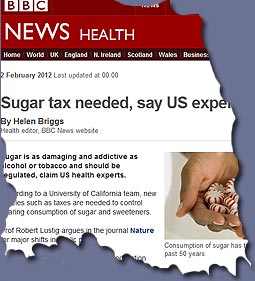 Their website as of Thursday 15 March 2012 refers to the findings of research in Italy in 2007, but says:
Their website as of Thursday 15 March 2012 refers to the findings of research in Italy in 2007, but says:
'EFSA assessed the study and raised a number of concerns regarding it. They concluded, that ‘there is no need to further review the safety of aspartame nor to revise the previously established ADI [average daily intake]'.
Worthy of note is the fact that both the Food Standards Agency in the UK and the European Food Standards Authority has been criticised for apparent lack of impartiality for having industry lobbyists as part of their boards.
It is argued that to date the outcome of legal, scientific and political enquires, accusations and fudged reports into both Searle and Aspartame, has resulted in a known carcinogen being marketed throughout the world as a safe alternative to sugar.
Not only that, this year the US government are being urged to highly tax the natural product of sugar, with the excuse that sugar consumption in the US is the major cause of diabetes and obesity!
If this happens, Aspartame or as it is now being branded AminoSweet, will be seen as the only so-called ‘natural’ alternative to sugar and as a result will ensure massive profits for the manufacturer Ajinnomoto Sweeteners Europe and its US counterparts.
Unionsafety web editor Chris Ingram commented:
"The controversy over chemical additives in food, drink and children's sweets, including not only Aspartame, but also Saccharin, and Acesulfame-K, will continue no doubt as evidence from consumers as to the ill effects suffered continues to be reported, and whilst scientists continue their research.
It is also interesting to note that Aspartame, unlike other human-made food additives; has its own industry lobby, the Aspartame Information Service.
This begs a question which needs to to be asked:
If Aspartame is purely a safe replacement for sugar, then why is it also added to food and drink which contains vast amounts of sugar already, and why is there a need for a special industry body for Aspartame alone?"
Whilst many say the case against Aspartame is all part of some conspiracy theory and over reaction, and that if a synthetic additive is not banned it is safe to consume, it must be remembered that for almost 30 years, the Tobacco industry hid the facts and even their own research which proved that smoking was a major cause of cancer and lung related illnesses. Further, Asbestos manufacturers knew about the hazards of asbestos seventy years ago - and again this knowledge was hidden from view.
Source: Huffington Post / FSA / Healthy Choices / Earthways / FDA / Are You Diabetic / Ajinomoto Sweeteners Europe / The Globe and Mail (Canada) / Rense / Foodbev / Health Report / Aspartame Info / Food Facts / Natural News / BBC news / Pepsi / Coca-cola /EFSA